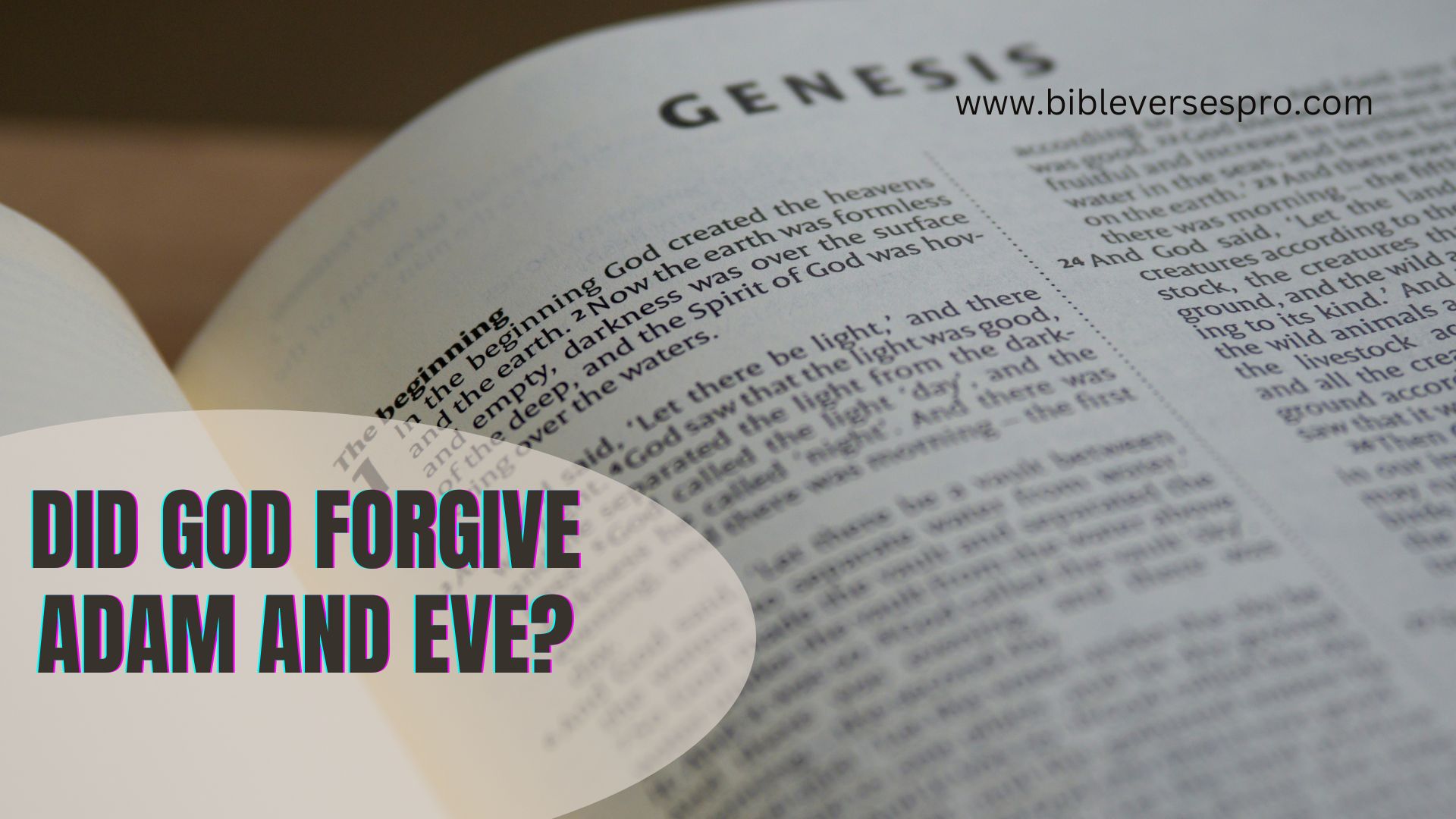The story of Adam and Eve is a fundamental narrative in the Abrahamic religions, marking the beginning of human history and the introduction of sin into the world.
Their disobedience in eating the forbidden fruit from the Tree of the Knowledge of Good and Evil led to their expulsion from the Garden of Eden.
One of the profound questions arising from this tale is did God forgive Adam and Eve? In this article, we delve into the theological perspectives surrounding this question and explore different interpretations.
Did God Forgive Adam and Eve?
In the biblical narrative, there is no explicit mention of God directly forgiving Adam and Eve for their disobedience in eating the forbidden fruit.
After Adam and Eve sinned, God pronounced punishments upon them and the serpent (Genesis 3:14-19). They were expelled from the Garden of Eden, and the consequences of their actions were set in motion.
However, while there is no explicit statement of forgiveness, some religious interpretations and traditions hold that God’s act of providing clothing for Adam and Eve after their sin (Genesis 3:21) can be seen as an act of mercy and care, suggesting that God did not abandon them completely.
This gesture could be viewed as an indication of God’s continuing concern for humanity despite their disobedience.
The Consequences of Disobedience:
Upon Adam and Eve’s disobedience, God pronounced judgments and consequences. The serpent was cursed, and both Adam and Eve were condemned to face challenges in their lives, including labor pains and toiling for sustenance.
These consequences serve as a reminder of the seriousness of their actions, emphasizing the importance of obedience to God’s commandments.
The Symbolic Act of God’s Care:
Despite the judgments, there are indications of God’s compassion and care for Adam and Eve.
After they realized their nakedness, God provided them with clothing made from animal skins (Genesis 3:21).
This act is often seen as a symbol of divine mercy and protection, suggesting that God did not abandon them entirely.
Rather, it demonstrates His continued love and provision for humanity, even after their fall from grace.
The Absence of Explicit Forgiveness:
While the Bible does not explicitly state God’s forgiveness towards Adam and Eve, religious interpretations and traditions differ on this matter.
Some argue that God’s act of clothing them shows an element of forgiveness, while others believe that the consequences themselves were a form of divine justice and mercy.
In either case, the story highlights the complexity of the divine-human relationship, where God’s justice and love intertwine.
Theological Interpretations:
The concept of forgiveness plays a central role in religious teachings. Many theological interpretations stress the importance of repentance and seeking forgiveness for sins.
For believers, the story of Adam and Eve serves as a cautionary tale, reminding them of the significance of acknowledging wrongdoing and seeking reconciliation with God.
God’s Unconditional Love:
Above all else, the narrative of Adam and Eve exemplifies God’s unconditional love for humanity.
Despite their disobedience and the introduction of sin into the world, God’s love remains steadfast.
The subsequent stories in religious texts reveal God’s plan for redemption through various prophets and ultimately through Jesus Christ in Christianity and Islam’s teachings.
What Does The Bible Say About Adam And Eve’s Sin?
In the Bible, the story of Adam and Eve’s sin is found in the book of Genesis, specifically in chapters 2 and 3.
The account begins with God creating Adam, the first man, and placing him in the Garden of Eden, a paradise filled with every kind of tree and plant. God then creates Eve, the first woman, as a suitable companion for Adam.
God gives Adam and Eve one commandment: they are free to eat from any tree in the garden except for the Tree of the Knowledge of Good and Evil. God warns them that if they eat from this tree, they will surely die (Genesis 2:16-17).
Unfortunately, Eve is tempted by the serpent, who deceives her into believing that eating from the forbidden tree will make her wise like God.
She eats the fruit and also gives some to Adam, who willingly eats it as well (Genesis 3:1-6).
As a consequence of their disobedience, several things happen:
1. Their Eyes Were Opened: After eating the fruit, Adam and Eve’s eyes were opened, and they realized they were naked, which brought them shame and guilt (Genesis 3:7).
2. Punishments Are Pronounced: God confronts Adam, Eve, and the serpent. He curses the serpent to crawl on its belly and introduces enmity between the serpent and humans. He pronounces pain in childbirth for women and foretells that they will desire their husbands, but their husbands will rule over them.
For Adam, God decrees that the ground will be cursed, and he will have to toil for food. Eventually, both Adam and Eve will return to the dust from which they were made (Genesis 3:14-19).
3. Expulsion from the Garden: To prevent Adam and Eve from eating from the Tree of Life and living forever in their fallen state, God expels them from the Garden of Eden (Genesis 3:22-24).
Did Adam And Eve Repent?
The Bible does not explicitly mention Adam and Eve’s repentance after their disobedience in eating the forbidden fruit.
The narrative in Genesis 3 shows that after they ate the fruit, they experienced guilt and shame, realizing their nakedness, and they tried to cover themselves with fig leaves.
When God confronted them about their actions, Adam and Eve did not directly express repentance for their disobedience.
The story of Adam and Eve is often seen as a cautionary tale, highlighting the consequences of sin and the importance of acknowledging wrongdoing.
FAQ’S
1. How does the concept of forgiveness play a role in the story of Adam and Eve?
The story of Adam and Eve emphasizes the complexity of the divine-human relationship and God’s unconditional love for humanity.
While the narrative does not explicitly state God’s forgiveness, it underscores the importance of seeking divine forgiveness and reconciliation for sins.
2. What lessons can we learn from the story of Adam and Eve’s sin?
The story teaches us about the consequences of disobedience and the importance of following God’s commandments.
It also highlights the need for repentance, the significance of God’s mercy and care, and the opportunity for redemption and reconciliation through faith and obedience.
3. What is the significance of Adam and Eve’s sin in religious teachings?
The story of Adam and Eve’s sin is considered the Fall of Man, and it is seen as the origin of original sin in many Christian traditions.
It highlights the importance of obedience to God’s commandments and the consequences of disobedience, leading to the need for redemption through Jesus Christ.
4. How did God respond to Adam and Eve’s sin?
After Adam and Eve’s disobedience, God pronounced judgments and consequences. They were expelled from the Garden of Eden, and they faced challenges, such as labor pains and toiling for sustenance.
These judgments served as a reminder of the seriousness of their actions and the importance of obedience.
What Did God Say To Adam And Eve After They Sinned?
After Adam and Eve sinned by eating the forbidden fruit from the Tree of the Knowledge of Good and Evil, God confronted them in the Garden of Eden.
The Bible records their conversation in the book of Genesis, specifically in Genesis 3:8-19. Here are some key points from what God said to Adam and Eve after their disobedience:
- Where are you? (Genesis 3:9): God called out to Adam and Eve, who were hiding among the trees in the garden because they realized they were naked and felt shame.
- Who told you that you were naked? (Genesis 3:11): God questioned Adam about how he knew he was naked, indicating that their disobedience had brought awareness of their vulnerability and sin.
- Have you eaten from the tree I commanded you not to eat from? (Genesis 3:11): God asked Adam directly about their disobedience, giving him a chance to confess.
- The woman you put here with me—she gave me some fruit from the tree, and I ate it (Genesis 3:12): Adam blamed Eve for giving him the fruit, indirectly shifting responsibility to her.
- What is this you have done? (Genesis 3:13): God asked Eve about her actions, holding her accountable for her disobedience as well.
- I will greatly increase your pains in childbearing; with pain, you will give birth to children (Genesis 3:16): God pronounced a specific consequence for Eve, making childbirth a painful experience.
- Your desire will be for your husband, and he will rule over you (Genesis 3:16): God described the new dynamics and challenges in the relationship between husband and wife as a consequence of their sin.
- Cursed is the ground because of you; through painful toil, you will eat from it all the days of your life (Genesis 3:17): God pronounced a specific consequence for Adam, making work and toil necessary for survival.
Conclusion
The question of whether God forgave Adam and Eve remains a topic of theological contemplation and interpretation within the Abrahamic religions.
While the Biblical account does not explicitly state God’s forgiveness, the narrative is rich with insights into divine mercy, human responsibility, and the complexities of redemption.
Different religious traditions offer diverse perspectives on this significant event, and the concept of God’s forgiveness continues to be a central theme in spiritual reflection and devotion for believers worldwide.
Ultimately, the story of Adam and Eve serves as a powerful reminder of the importance of humility, repentance, and seeking reconciliation with the divine.







